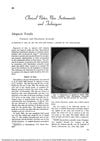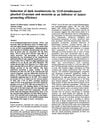1 citations,
July 2022 in “Clinical, Cosmetic and Investigational Dermatology” Taohong Siwu Decoction may help treat hair loss by targeting multiple genes and pathways.
January 2025 in “Molecules” Caffeine may help with hair loss, but more research is needed to confirm its effectiveness.
 November 2024 in “International Journal of Molecular Sciences”
November 2024 in “International Journal of Molecular Sciences” Nanoparticles may improve caffeine delivery for hair growth, offering a potential alternative to minoxidil for hair loss treatment.
 July 2024 in “ACS Biomaterials Science & Engineering”
July 2024 in “ACS Biomaterials Science & Engineering” Nanoencapsulated antibiotics are more effective in treating hair follicle infections than free antibiotics.
 December 2023 in “Azerbaijan Pharmaceutical and Pharmacotherapy J”
December 2023 in “Azerbaijan Pharmaceutical and Pharmacotherapy J” The minoxidil gel could be a better treatment for hair loss than traditional forms.
 October 2023 in “Biomaterials”
October 2023 in “Biomaterials” Nanotechnology could improve hair regrowth but faces challenges like complexity and safety concerns.
 July 2023 in “Journal of Cosmetic Dermatology”
July 2023 in “Journal of Cosmetic Dermatology” Ethosomes could improve how well skin treatments work, but more research is needed on their safety and stability.
 December 2022 in “Frontiers in Pharmacology”
December 2022 in “Frontiers in Pharmacology” Tianma Gouteng decoction may help prevent hair loss and promote hair growth.
November 2018 in “Journal of dermatology & cosmetology” The document reports the first case of a rare skin condition in Colombia, the 19th case worldwide.
April 2023 in “International Journal of Pharmaceutics” Melatonin in a special emulsion can help treat hair loss more effectively.
November 2022 in “Clinical, Cosmetic and Investigational Dermatology” The combined treatment for hair loss is effective, easy to use, and has mild side effects.
September 2022 in “International Journal of Trichology” Both microneedling and injections are equally effective for treating alopecia areata.
 130 citations,
August 2020 in “Drug Design Development and Therapy”
130 citations,
August 2020 in “Drug Design Development and Therapy” Nanoparticles can improve skin drug delivery but have challenges like toxicity and stability that need more research.
 25 citations,
July 2019 in “Journal of drug delivery science and technology”
25 citations,
July 2019 in “Journal of drug delivery science and technology” Researchers created better skin-application menthol capsules that are stable, safe, and penetrate the skin quickly.

Dermatoscopy and videodermatoscopy are useful for diagnosing and monitoring various skin, hair, and nail conditions.
 70 citations,
February 2015 in “Expert Opinion on Drug Discovery”
70 citations,
February 2015 in “Expert Opinion on Drug Discovery” Topical drugs and near-infrared light therapy show potential for treating alopecia.
 22 citations,
March 1963 in “Archives of dermatology”
22 citations,
March 1963 in “Archives of dermatology” A woman regrew her hair significantly using a corticosteroid cream with a plastic cover.
 16 citations,
November 2020 in “International journal of pharmaceutics”
16 citations,
November 2020 in “International journal of pharmaceutics” Using longer PEG chains helps nanoparticles penetrate hair follicles better, improving drug delivery for conditions like alopecia.
 June 2023 in “Sains Malaysiana”
June 2023 in “Sains Malaysiana” Cinchonine Nanostructured Lipid Carriers serum safely and effectively stimulates hair growth and increases the number and size of hair follicles.
 October 2020 in “Revista médica sinergía/Revista médica sinergia”
October 2020 in “Revista médica sinergía/Revista médica sinergia” Alopecia areata is a complex condition causing hair loss, linked to genetics and immune system issues, and may be related to other autoimmune diseases; treatments vary in effectiveness.
96 citations,
April 2017 in “Oncotarget” Smaller nanoemulsions can penetrate skin and hair follicles better, which may be useful for delivering drugs and vaccines through the skin.
 224 citations,
March 2006 in “Seminars in Cutaneous Medicine and Surgery”
224 citations,
March 2006 in “Seminars in Cutaneous Medicine and Surgery” The document concludes that understanding hair follicle biology can lead to better hair loss treatments.
 115 citations,
August 2008 in “The Journal of Clinical Endocrinology & Metabolism”
115 citations,
August 2008 in “The Journal of Clinical Endocrinology & Metabolism” Thyroid hormones help hair grow, reduce hair loss, and increase hair pigment.
 77 citations,
January 1980 in “Carcinogenesis”
77 citations,
January 1980 in “Carcinogenesis” TPA is about 50 times more effective at promoting tumors than MZ.
 76 citations,
March 2005 in “Journal of Molecular Medicine”
76 citations,
March 2005 in “Journal of Molecular Medicine” Certain mice without specific receptors or mast cells don't lose hair from stress.
 71 citations,
May 2007 in “The FASEB journal”
71 citations,
May 2007 in “The FASEB journal” Human hair follicles produce and respond to erythropoietin, helping protect against stress.
 56 citations,
November 2010 in “Pigment Cell & Melanoma Research”
56 citations,
November 2010 in “Pigment Cell & Melanoma Research” Brain hormones significantly affect hair color and could potentially be used to prevent or reverse grey hair.
 24 citations,
October 1994 in “Fertility and Sterility”
24 citations,
October 1994 in “Fertility and Sterility” People with hair loss may have different levels of certain hormones due to changes in hormone processing.
 23 citations,
March 2001 in “Clinics in dermatology”
23 citations,
March 2001 in “Clinics in dermatology” Alopecia areata involves immune response and gene changes affecting hair loss.
 17 citations,
July 1994 in “Journal of Dermatological Science”
17 citations,
July 1994 in “Journal of Dermatological Science” The cause of alopecia areata is likely a mix of genetics, immune system issues, and environmental factors, with more research needed to understand it fully.






















